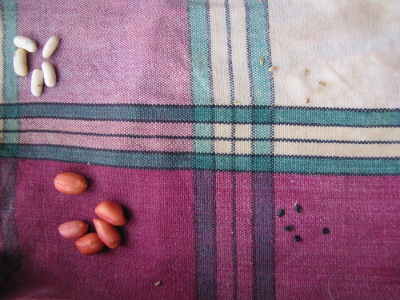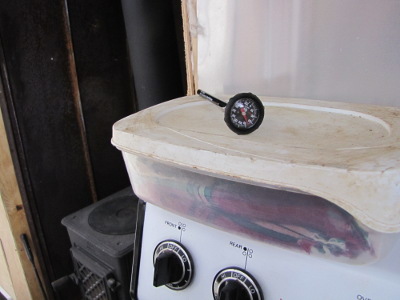
Seed germination test
 Days
when the snow fills the air are perfect for planning next summer's
garden and ordering seeds. The first step is to go through all of
my old seeds to see which ones will last another year and which ones
need to be replaced. I've posted previously about how long
seeds last,
but you have to take that chart with a grain of salt --- we live in a
very humid climate and I haven't gotten around to making a good seed
storage box, so some of our seeds have less longevity than they
should. For example, some turnip seeds that I thought had a year
or two left in them completely failed to germinate in 2010, so those
bit the dust and will be replaced.
Days
when the snow fills the air are perfect for planning next summer's
garden and ordering seeds. The first step is to go through all of
my old seeds to see which ones will last another year and which ones
need to be replaced. I've posted previously about how long
seeds last,
but you have to take that chart with a grain of salt --- we live in a
very humid climate and I haven't gotten around to making a good seed
storage box, so some of our seeds have less longevity than they
should. For example, some turnip seeds that I thought had a year
or two left in them completely failed to germinate in 2010, so those
bit the dust and will be replaced.
Meanwhile, I had five
species that I just wasn't sure of. One was
parsley that I harvested this year in the garden, but am not sure I
matured well enough on the plant. Another is bean seeds saved
from 2009 (or was it 2008?). Last year's corn and peanut
seeds should still be good, but both can have low germination rates
after the first year, so I wanted to try them out. Finally, I
have extra onion seeds from last year, but they didn't germinate well
in the spring garden --- did I just plant them when the soil was too
cold, or were the seeds a dud to begin with?
 I
placed five seeds of each questionable variety between two moistened
cloth
napkins in a plastic container for a germination test. Those of
you with conventional kitchens may choose to use paper towels, but
disposables are verboten in our household. Since all of these
seeds
prefer relatively warm temperatures for germination, I've situated the
container on the back of the electric stove where heat from the wood
stove keeps temperatures around 70 degrees during the day. Night
temperatures will fall much lower, but I'll just add a few days onto my
germination test to take that into consideration. In conventional
kitchens, finding a warm spot is often easier --- just put your
germination chamber on top of the fridge or hot water tank.
I
placed five seeds of each questionable variety between two moistened
cloth
napkins in a plastic container for a germination test. Those of
you with conventional kitchens may choose to use paper towels, but
disposables are verboten in our household. Since all of these
seeds
prefer relatively warm temperatures for germination, I've situated the
container on the back of the electric stove where heat from the wood
stove keeps temperatures around 70 degrees during the day. Night
temperatures will fall much lower, but I'll just add a few days onto my
germination test to take that into consideration. In conventional
kitchens, finding a warm spot is often easier --- just put your
germination chamber on top of the fridge or hot water tank.
Now I just need to wait
and see what happens. See
this site for optimal germination temperature and time to germination
for many common vegetables. After two and a half
weeks have passed, I'll conclude the experiment and order any of the
seeds that didn't germinate well, or choose to just double or triple my
seeding rate for the spring.
Want more in-depth information? Browse through our books.
Or explore more posts by date or by subject.
About us: Anna Hess and Mark Hamilton spent over a decade living self-sufficiently in the mountains of Virginia before moving north to start over from scratch in the foothills of Ohio. They've experimented with permaculture, no-till gardening, trailersteading, home-based microbusinesses and much more, writing about their adventures in both blogs and books.
Want to be notified when new comments are posted on this page? Click on the RSS button after you add a comment to subscribe to the comment feed, or simply check the box beside "email replies to me" while writing your comment.

We just did something similar. My daughter asked if it was possible to grow our own wheat, instead of buying it. I wasn't sure if the wheat seeds we buy would germinate, so we put some on a moist paper towel.
It was a great educational experience for her to watch them germinate, and we proved that the seeds are viable and so will try planting some.
Darren --- I think I probably find it just as much fun as your daughter does. Our seeds are already sprouting, and I just keep smiling to see those little bits of life.
Our seeds are already sprouting, and I just keep smiling to see those little bits of life.
As a side note, I think winter and spring wheats tend to be different varietes --- it might be worth making sure the kind you're growing matches the season you're in. (Probably gearing up for winter wheat down under?)
Edward --- good ideas! That's just the kind of alternatives I'm looking for.